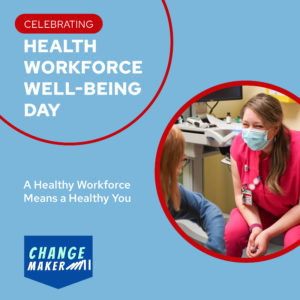 March 18 marks the 2nd annual National Health Workforce Well-Being Day. Established in 2024 by the National Academy of Medicine (NAM), the day aims to recognize the intrinsic importance of protecting health workers’ well-being and the significance of sustaining the health system and ensuring quality patient care. Sarah Webber, MD, associate professor, Division of Hospital Medicine and Complex Care, is the director of well-being for the Department of Pediatrics. She suggested a few ways department members can observe the day.
March 18 marks the 2nd annual National Health Workforce Well-Being Day. Established in 2024 by the National Academy of Medicine (NAM), the day aims to recognize the intrinsic importance of protecting health workers’ well-being and the significance of sustaining the health system and ensuring quality patient care. Sarah Webber, MD, associate professor, Division of Hospital Medicine and Complex Care, is the director of well-being for the Department of Pediatrics. She suggested a few ways department members can observe the day.
“Individuals can recognize this day by talking about well-being issues with colleagues and teammates and by reflecting on how they can promote a culture of well-being at work,” she said. “Leaders — who play a critical role in workforce well-being — can reflect on their leadership approach and how it aligns with wellness-centered leadership behaviors. They can also think about ways to incorporate well-being priorities into the everyday work of their teams so individuals feel valued and are able to contribute.”
While the National Health Workforce Well-Being Day is an opportunity to highlight well-being across the country, it’s a topic that Webber and her team think about every day.
Webber began to bring the issue of burnout and the need for stress reduction to the department in the late 2010s, around the same time this conversation was reaching a tipping point on a national level. In July 2019, the department organized its efforts and named Webber the department’s first director of well-being.

As the director of well-being, Webber’s goal is to support the emotional and psychological resilience, physical health, connection, meaning and purpose, and authenticity of department members — evidence-based contributors to well-being. One of her early initiatives was a longitudinal QI project that yielded sleep improvements for pediatric hospital medicine on-call attendings. Webber also led presentations at the department level and school wide on topics including self-compassion and well-being at work.
In 2023, under the direction of Webber, the department launched the How We Work initiative, which aimed to support department members in their pursuits to engage in productive, meaningful, and collaborative work. People who participated in the yearlong initiative reported a reduction in email interruptions and an increase in their use of time blocking. Nearly 60% of participants said How We Work supported their overall well-being.
Webber described How We Work as a fun way to engage stakeholders across the department and encourage department members to consider the way they work as a contributor to well-being. “This is critical because at times wellness messages can feel like advice to add something to your day, and that can be frustrating for busy people,” she said. “Instead, we invited people to take something away, to focus on what work really mattered to them, and to support each other in the commitment for focused, meaningful work time.”
This month, the well-being group is launching a new initiative — “Living through Change & Challenge: Coaching Circles” (NetID required for login). This is an opportunity for the well-being group to help support department members in their efforts to meet ongoing uncertainties and challenges in an evolving world. Webber, a trained coach, will facilitate the coaching sessions. All department members are invited to participate.
Under Webber’s direction, the Department of Pediatrics is in line with local and national initiatives to integrate well-being into organizational strategy and culture. Its efforts have been innovative and effective. Last year, the department made a national commitment to support health workforce well-being when it joined 400 other organizations and became a NAM Change Maker. Change Makers are dedicated to organizational progress that will establish health worker well-being as an embedded value at the institutional level.
“This work is long-term and involves incorporating well-being values into a large and complex structure that sometimes has competing values,” Webber said. “Overall, the department has been invested in valuing well-being, and I look forward to seeing this evolve under new leadership.”
If you’re a department member who is committed to promoting workplace well-being, you can join one of the department’s well-being advisory committees or connect one-on-one with Webber. Email Jenna Contreras for details.